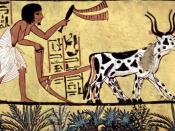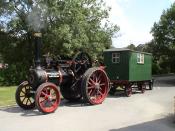"The Agricultural Revolution was economically essential and socially undesirable." Discuss
Neil Adams 9B
The Agricultural Revolution was a change in farming, which would change every single aspect of farming that people before then had known. This revolution in farming really took off from the late 18th Century into the 19th Century, although some people today still argue that it never stopped and has kept on going right up to this moment, and even that the revolution may never stop! There were important (some may even say necessary) changes on our country's economy (businesses, etc.), however these some of these changes were socially undesirable which means that some of the ordinary people didn't benefit.
Firstly, an essential thing the Revolution bought to our economy was that more food was readily available. With more food, we had more of an opportunity to trade. More food came about, because of a man named Charles Townshend.
He was the man that changed the century-old method of open fields to the method, we see today in our farmers' fields, called the enclosed field system. With this system and animals could be separated and land could be managed much more efficiently. Because of Charles Townshend's enclosure of the fields, a man called Robert Bakewell could implement his new idea. It was known as 'selective breeding'. The connection between 'having more food' and 'the selective breeding programme', was that he would choose the animals he bred carefully. He chose them for their muscle (if he wanted a better working animal), for their size (if he wanted bigger animals with more meat for food), and for other good qualities that would improve the size and look of animals. With this method he made small, skinny like there were before the change, to the bigger, meatier animals we see...


